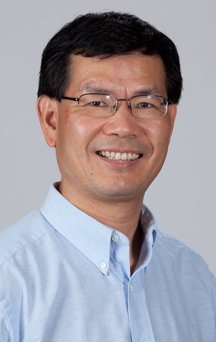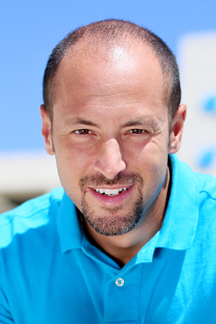Of Note
Ben Shen Receives Biotechonology Research Award
Ben Shen, professor and vice chairman of the Department of Chemistry and director of the Natural Products Library Initiative at The Scripps Research Institute (TSRI), has received the Promega Biotechnology Research Award from the American Society for Microbiology (ASM), honoring outstanding contributions to the applications of biotechnology through fundamental microbiological research and development.
Shen was recognized as a “world leader in the biosynthesis of natural products, e.g., antibiotics and antitumor agents,” according to the award announcement. He gave an award lecture, “Microbial Genomics: New Opportunities for Natural Product Biosynthesis, Engineering and Drug Discovery,” at ASM’s recent 115th General Meeting in New Orleans.
The ASM is the largest single life-science society, with more than 39,000 members worldwide.
Shen and his lab colleagues study the chemistry, biochemistry and genetics of the biosynthesis of microbial secondary metabolites. For further information on Shen’s work, see his faculty webpage and laboratory website.
Phil Baran Wins 2015 EROS Best Reagent Award
Phil Baran, TSRI professor and Darlene Shiley Chair in Chemistry, has won the 2015 EROS Best Reagent Award, sponsored by Aldrich Chemical and John Wiley & Sons to recognize the work of selected synthetic chemists submitted to the Encyclopedia of Reagents for Organic Synthesis (EROS).
Baran has been honored for developing zinc trifluoromethanesulfinate, an air-stable and moisture-tolerant reagent that offers significant advantages for use in the trifluoromethylation of heteroarenes. Baran, with Staff Scientist Yoshihiro Ishihara and graduate student Ryan Gianatassio, recently summarized uses of the reagent in an October 2014 EROS article.
Noting that “it’s really an award to the group,” Baran plans to use the award’s $10,000 cash prize to take the graduate students in his lab to the American Chemical Society’s December Pacifichem meeting in Hawaii where each will present posters.
For additional information on Baran’s research, see his faculty webpage and lab website.
Cell Paper Highlights Successes in Molecular Libraries Program
A drug discovery program funded by the National Institutes of Health and co-led by scientists at TSRI has led to potential new therapies for malaria, inflammation, diabetes, Alzheimer’s, schizophrenia and many more conditions, as reported in a recent “Perspective” paper in the journal Cell.
The paper is a reflection on the successes and challenges of the decade-long Molecular Libraries Program (MLP), a nationwide initiative to screen small molecules against possible drug targets to develop novel chemical probes, with the long-term goal of developing new and more effective therapies for disease.
At TSRI, the MLP was a bicoastal operation led by Scripps California Professor Hugh Rosen. Success stories from the TSRI Molecular Screening Center include the identification of a compound called ozanimod by Rosen and TSRI Professor Edward Roberts. Ozanimod is now licensed to Receptos, Inc. and is currently in Phase III clinical trials as a treatment for relapsing multiple sclerosis, separate Phase III trials for ulcerative colitis and Phase II trials for Crohn’s disease.
“The Cell Perspective illustrates why TSRI is at the forefront of chemical biology,” said Rosen. “The strength of basic discovery and medical breakthroughs at TSRI reflect the inordinate strengths of the TSRI faculty, and their ability to operate together in finding multi-disciplinary solutions to the most disabling and difficult human diseases.”
Rosen noted that TSRI Professor Ben Cravatt’s collaboration with the TSRI MLP led to the invention of new methods for discovering probes for enzymes without known substrates, giving insights into potential disease treatments. The MLP also supported TSRI Professor Patrick Griffin’s research to produce chemical probes that have validated therapeutic targets and provided new biological insights into metabolic diseases such as diabetes.
In fact, researchers using small molecule screening at TSRI have produced more than 150 publications since the launch of the MLP. “The MLP concluded after 10 years, but the TSRI technologies and expertise continue in the unique synthesis of chemistry and biology projects,” said Rosen.
To learn more about the TSRI Molecular Screening Center, go to http://mlpcn.florida.scripps.edu/. To access the Cell paper, go to http://www.cell.com/abstract/S0092-8674%2815%2900572-3.
Send comments to: mikaono[at]scripps.edu















